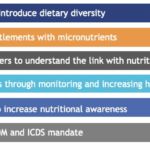Water Scarcity Can’t be Solved by a Single Sector: How Businesses and NGOs Can Work Together to Advance Water Security
Around the world, 2 billion people (26% of the global population) still lack access to safely managed drinking water, and a staggering 3.6 billion people (46% of the world’s population) lack basic sanitation, as of 2021. Regardless of the economic status of the nations they run through, pollution continues to reduce water quality in numerous rivers across Latin America, Africa and Asia. And globally, vital and delicate wetlands are shrinking at an alarming 0.2% annually — and that rate is increasing. At the same time, the growing world population — along with increased industrialization, urbanisation and shifting consumption patterns — are intensifying the demand for water resources worldwide.
All of these factors underscore the urgent need to make progress on a wide range of water issues, including access to clean water, sanitation, public health wastewater management and utility management. Yet current trajectories indicate a significant shortfall in meeting Sustainable Development Goal (SDG) 6 — clean water and sanitation for all — targets, primarily due to economic disenfranchisement and underfunding, particularly in the Global South.
In the ongoing battle against global water scarcity, the need for collaborative action between water-focused non-profits/NGOs and for-profit businesses, especially corporations and larger enterprises, has never been more apparent or more important. Achieving SDG 6 demands heightened multilateral cooperation and fortified cross-sector partnerships to bridge the gaps in implementing initiatives that can reach these various targets. Below, I’ll discuss how forging partnerships between for-profit businesses and NGOs will deliver benefits for both — while offering a key opportunity to combat water scarcity at a global scale.
The Need for More Private Sector Involvement in Global Water Security
Corporate and private investors simply aren’t investing enough in water infrastructure. Currently, annual spending in the water sector is $164 billion, with only 1.7% coming from private sources. This puts a lot of pressure on public sector funding, which is limited due to competing priorities and resources. Governments frequently have limited budgets and may struggle to allocate adequate funds for water infrastructure improvements, particularly when competing with other social needs. As a result, private funding must be mobilised; however, the water sector faces challenges in attracting necessary private capital investments. This is due to factors like the increased risks of drought and flooding introduced by climate change, and the fact that some water utilities lack clear or well-developed financial strategies.
To help surmount these challenges, it is clear that innovative financing solutions need to be mobilised to ensure that water security is available to all. To that end, private sector business and investment can contribute significantly by providing financial resources and technical assistance — whether through corporate social responsibility programs, direct investments or other measures — that will amplify the scale and impact of water projects implemented by NGOs. By channelling funds and related support into these initiatives, investors and businesses can catalyse progress towards sustainable water management on a larger scale and bolster global efforts to combat water scarcity.
Additionally, larger businesses possess the capacity to extend the reach of water NGOs’ solutions and related awareness campaigns through their expansive commercial and media networks. Leveraging their expertise in logistics and project management, corporations can facilitate the implementation of water initiatives with greater efficiency. And through marketing, businesses can effectively disseminate information that raises public awareness of these initiatives and fosters behaviour change, encouraging people to adopt sustainable practices that save water on a large scale.
The Advantages of Collaboration Between Water NGOs and Businesses
But private sector players shouldn’t view these efforts simply as charity. Collaboration with NGOs can help for-profit businesses improve their social impact and reputation for corporate and community responsibility. Contributing to the resolution of an important and ubiquitous global issue like water scarcity can enhance their social credentials, thereby fortifying and uplifting their brand image and reputation. This, in turn, may increase customer loyalty and attract socially conscious investors.
On the other side of the equation, NGOs bring invaluable assets to these partnerships, such as specialised knowledge, community trust and grassroots connections. Their extensive knowledge of local contexts and needs can help in the design and implementation of effective and well-targeted water management solutions. And NGOs often have credibility and trust within these communities, which is critical for gaining local support and ensuring the long-term success of collaborative water initiatives.
Advocacy and policy engagement can also be part of NGO/for-profit partnerships. Both partners can use their collective voices to advocate for water-related policies and regulations that promote sustainability and equitable access to clean water. Working together, they can drive systemic change at the local, national and international levels by leveraging their respective networks and influence, creating an environment that’s beneficial to long-term water security.
Furthermore, collaboration between NGOs and for-profit businesses can lead to valuable research and innovation. Both parties can collaborate to develop, test and fund innovative technologies and approaches to water conservation, purification and distribution. Collaborative research and development efforts can lead to breakthroughs in water management practices, resulting in more efficient and sustainable water resource use.
Adopting a collaborative approach will have a positive long-term impact on water scarcity, as the financially efficient models and practices of the private sector will increase the effectiveness of investments in joint projects between NGOs and businesses. The lower financial cost of an efficient collaborative partnership — alongside the potential for broad-reaching impact — underscores the value of these partnerships. Together, water-focused NGOs and their business partners can harness their collective power to accelerate progress, effect meaningful change and address complex water challenges.
An Innovative Example of How Water NGOs and Corporations Can Partner for Greater Impact
The Water Unite Impact fund is an example of how NGOs and corporations can partner to make a meaningful impact. Set up by the NGO Water Unite and managed by the impact investment manager Weller’s Impact, the fund employs a catalytic capital structure that leverages Water Unite’s micro-contribution programme, which receives one cent donations for every product sold by retailers such as The Co-op and Elior UK, while also attracting capital from private sector investors. This innovative blended finance structure reduces risks for private investors by utilising these micro-contributions as a credit enhancer, with this funding acting as the first loss tranche for innovative programs, which reduces the financial risk for the senior capital private investors that support these initiatives. This approach supports circular economy solutions across the Water Unite Impact fund’s diverse portfolio, resulting in a variety of social and environmental impacts.
Using this model, Water Unite Impact has partnered with the NGO Sanivation, an innovative sustainable sanitation solution provider, in an effort to improve access to sanitation across Africa. Sanivation designs, builds and operates circular economy treatment plants which take in sludge from pit latrines and septic tanks. This waste is treated, then combined with other waste products such as sawdust to produce a briquette which can be used as an alternative to firewood. Through this collaborative partnership, Sanivation now works with local governments and water utilities to operate seven treatment sites in Kenya; Naivasha, Malindi, Wajir, Kakuma, Kisii, Embu and Nyahururu, which employ 54 local people working on waste management projects. In 2022 they served 52,675 people by safely managing 995 tonnes of faecal sludge and selling 882.7 tonnes of briquettes. This provides a low-carbon bioenergy alternative to fossil fuels, while saving the equivalent of 1,645 tonnes of CO2 and 18,075 trees.
Partnerships like this are proving the worth of collaborative approaches to global water challenges, and demonstrating the measurable benefits that can be delivered for communities and the environment. By pooling the respective strengths and resources of NGOs and private businesses through these types of approaches, we can develop sustainable solutions that benefit both people and the planet, creating a future where access to clean water is a universal reality.
Amelia Metcalf is a marketing and communications professional at Water Unite.
Photo credit: Alexander James-Aylin
- Categories
- Environment, Investing, WASH



